#rd laing
Text









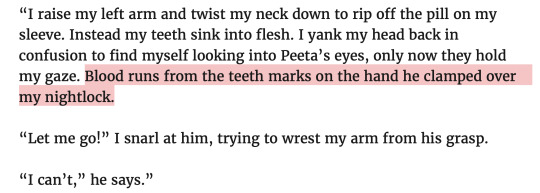
i worry that love is violence
citizen illegal, josé olivarez / angel of small death & the codeine scene, hozier / black iris, leah raeder/ r.d. laing / the tale of despereaux, kate dicamillo / litany in which certain things are crossed out, richard siken / blue lily, lily blue, maggie stiefvater / john my beloved, sufjan stevens / litany in which certain things are crossed out, richard siken / mockingjay, suzanne collins
#year:2023#web weaving#parallels#citizen illegal#Jose olivarez#love is violence#love#blood#angel of small death & the codeine scene#hozier#black iris#Leah Raeder#rd Laing#the tale of despereaux#Kate DiCamillo#litany in which certain things are crossed out#Richard siken#blue lilly lilly blue#trc#the raven cycle#Maggie Stiefvater#john my beloved#sufjan stevens#mockingjay#hunger games#suzanne collins#the hunger games#thg
572 notes
·
View notes
Text
The creative breath "comes from a zone of man where man cannot descend, even if Virgil were to lead him, for Virgil would not go down there."
This zone, the zone of no-thing, of the silence of silences, is the source. We forget that we are all there all the time.
An activity has to be understood in terms of the experience from which it emerges. These arabesques that mysteriously embody mathematical truths only glimpsed by a very few-how beautiful, how exquisite-no matter that they were the threshing and thrashing of a drowning man.
We are here beyond all questions except those of being and nonbeing, incarnation, birth, life and death.
Creation ex nihilo has been pronounced impossible even for God. But we are concerned with miracles. We must hear the music of those Braque guitars (Lorca).
From the point of view of a man alienated from its source creation arises from despair and ends in failure. But such a man has not trodden the path to the end of time, the end of space, the end darkness, and the end of light. He does not know that where it all ends, there it all begins.
- the politics of experience
10 notes
·
View notes
Text
"The only pain that can be avoided is the pain that comes from trying to avoid unavoidable pain"
(R.D. Laing)
22 notes
·
View notes
Text
I pensieri continuano, ormai sto passando dall’altra parte. Il mio vero io è giù in fondo: prima ce l’avevo qui nella gola, ma ora è sceso giù. Mi sto perdendo: è sempre più in fondo. Vorrei dire tante cose ma ho paura. Ho la testa piena di pensieri, di paure, di gelosie, di odio. Ma la testa non li può tenere, tutti questi pensieri. Io sto qui, dietro la fronte: voglio dire la mia coscienza. E i pensieri mi spaccano la testa! Questo è schizofrenia, non è vero? Ma non so se ho veramente questi pensieri. Forse me li sono preparati l’altra volta per farmi curare. Se solo potessi amare ancora, invece di odiare. Mi piacerebbe tanto amare la gente, eppure la voglio odiare. E così mi sto uccidendo.
Rosa, da L’io diviso di R. Laing
8 notes
·
View notes
Text

“The specifically human feature of human groupings can be exploited to turn them into the semblance of nonhuman systems.
We do not now suppose that chemical elements combine together because they love each other. Atoms do not explode out of hatred. It is men who act out of love and hatred, who combine for defense, attack, or pleasure in each other's company.
All those people who seek to control the behavior of large numbers of other people work on the experiences of those other people. Once people can be induced to experience a situation in a similar way, they can be expected to behave in similar ways. Induce people all to want the same thing, hate the same thing, feel the same threat, then their behavior is already captive - you have acquired your consumers or your cannon-fodder. Induce a common perception of Negroes as subhuman, or of whites as vicious and effete, and behavior can be concerted accordingly.
However much experience and action can be transformed into quantitatively interchangeable units, the schema for the intelligibility of group structures and permanence is of quite a different order from the schema we employ when we are explaining relative constancies in physical systems. In the latter case, we do not, in the same way, retrace the constancy of a pattern back to the reciprocal interiorization of the pattern by whatever one regards as the units comprising it. The inertia of human groups, however, which appears as the very negation of praxis, is in fact the product of praxis and nothing else. This group inertia can only be an instrument of mystification if it is taken to be part of the "natural order of things." The ideological abuse of such an idea is obvious. It so clearly serves the interests of those whose interest it is to have people believe that the status quo is of the "natural order," ordained divinely or by "natural" laws. What is less immediately obvious, but no less confusing, is the application of an epistemological schema, derived from natural systems, to human groups. The theoretical stance here only serves to intensify the dissociation of praxis from structure.
The group becomes a machine - and that it is a man-made machine in which the machine is the very men who make it is forgotten. It is quite unlike a machine made by men, which can have an existence of its own. The group is men themselves arranging themselves in patterns, strata, assuming and assigning different powers, functions, roles, rights, obligations and so on.
The group cannot become an entity separate from men, but men can form circles to encircle other men. The patterns in space and time, their relative permanence and rigidity, do not turn at any time into a natural system or a hyperorganism, although the fantasy can develop, and men can start to live by the fantasy that the relative permanence in space-time of patterns and patterns of patterns is what they must live and die for.
It is as though we all preferred to die to preserve our shadows.
For the group can be nothing else than the multiplicity of the points of view and actions of its members, and this remains true even where, through the interiorization of this multiplicity as synthesized by each, this synthesized multiplicity becomes ubiquitous in space and enduring in time.
It is just as well that man is a social animal, since the sheer complexity and contradiction of the social field in which he has to live is so formidable. This is so even with the fantastic simplifications that are imposed on this complexity, some of which we have examined above.
Our society is a plural one in many senses. Any one person is likely to be a participant in a number of groups, which may have not only different memberships, but quite different forms of unification.
Each group requires more or less radical internal transformation of the persons who comprise it. Consider the metamorphoses that one man may go through in one day as he moves from one mode of sociality to another family man, speck of crowd dust, functionary in the organization, friend. These are not simply different roles: each is a whole past and present and future, offering differing options and constraints, different degrees of change or inertia, different kinds of closeness and distance, different sets of rights and obligations, different pledges and promises.
I know of no theory of the individual that fully recognizes this. There is every temptation to start with a notion of some supposed basic personality, but halo effects are not reducible to one internal system. The tired family man at the office and the tired businessman at home attest to the fact that people carry over, not just one set of internal objects, but various internalized social modes of being, often grossly contradictory, from one context to another.
Nor are there such constant emotions or sentiments as love, hate, anger, trust or mistrust. Whatever generalized definitions can be made of each of these at the highest levels of abstraction, specifically and concretely, each emotion is always found in one or another inflection according to the group mode it occurs in. There are no "basic" emotions, instincts or personality, outside of the relationships a person has within one or another social context.
There is a race against time. It is just possible that a further transformation is possible if men can come to experience themselves as "One of Us." If, even on the basis of the crassest self-interest, we can realize that We and They must be transcended in the totality of the human race, if we in destroying them are not to destroy us all.
As war continues, both sides come more and more to resemble each other. The uroborus eats its own tail. The wheel turns full circle. Shall we realize that We and They are shadows of each other? We are They to Them as They are They to Us. When will the veil be lifted? When will the charade turn to carnival? Saints may still be kissing lepers. It is high time that the leper kissed the saint.” (p. 64 - 67)
#laing#r d laing#rd laing#politics#experience#psychiatry#antipsychiatry#groups#humans#uroborus#oroboros#war#lacan#books#bookshelf#library#sartre
6 notes
·
View notes
Text
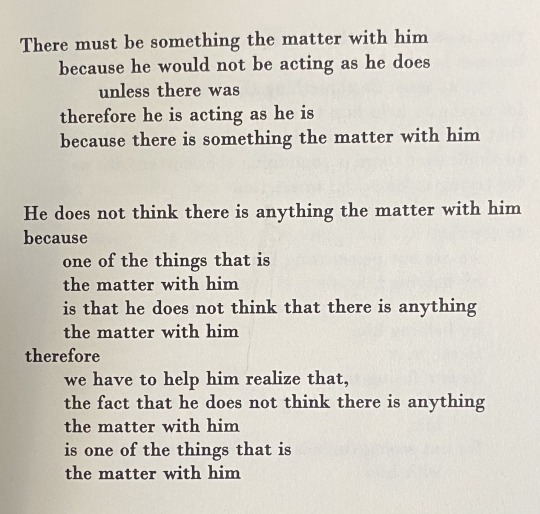

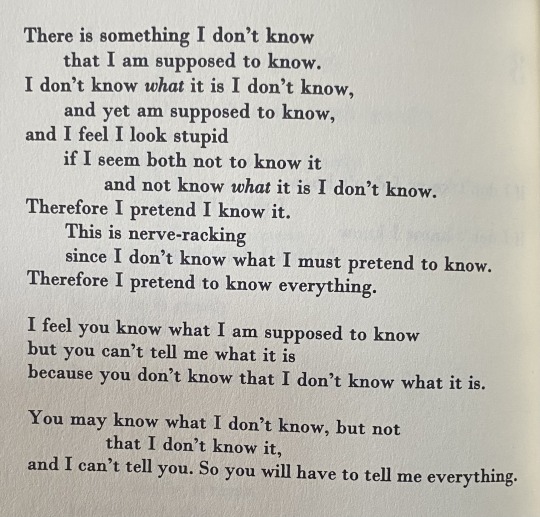
Gentle Giant, Knots
and from R.D. Laing’s Knots
10 notes
·
View notes
Text
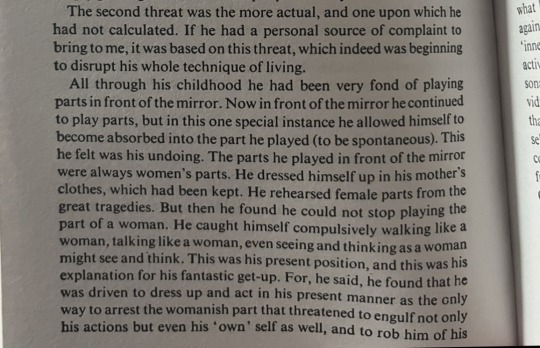
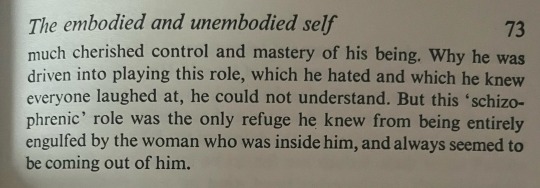
A BORDERLINE CASE – ‘DAVID’
In pages 69-73 of Penguins’ Modern Classics print of The Divided Self by R.D. Laing, ‘David’ is depicted as one of R.D. Laing’s many “borderline cases”. David here is depicted as a case of disembodiment and ‘schizophrenic tendencies’, and while they are documented by Laing with he/him pronouns, their case and symptoms seem to align solely with “dressing up” and ultimately, “dressing as a woman”, much to their own dismay.
#images#book#bookblr#the divided self by rd laing#tw psychoanalysis#tw outdated ideologies#tw schizophrenia#tw diagnosis#psychology#transgender#trans#mtf#case of david#rd laing#tw possible misgendering#justice for david
6 notes
·
View notes
Text
The King and I
Rule Britannia, Britannia rules the waves, or it did, once upon a time, now it is just a place of Brexit and declining influence.
I am worried about next weekend.
It is the coronation of King Charles.
I gather he is the third.
I restrained myself when the Queen died, she did, after all, die, and it is never great to celebrate someone’s passing.
I put to one side all my thoughts about the crown and colonialism, all the badness that is inherent in the English aristocracy – the landowners, the men in Burberry Range Rovers,…

View On WordPress
#autism#Blindboy#David Walliams#deportation#Exodus 1947#Leon Uris#Matt Lucas#Perfidious Albion#RD Laing#The King
0 notes
Text
R. D. Laing said, among other things, that the majority of the pain in the world is caused by trying to avoid pain.
Sure enough, we all can see that real solutions are often discouraged or discarded in favor of temporary or illusory ones. Homeless people are shoved out of certain neighborhoods using policing and/or hostile architecture - out of sight, out of mind, but it only makes their situation "someone else's problem". A politician promises higher wages, and if he keeps his promise, the prices will inevitably rise too - in the end, the policy has accomplished nothing. A drug dealer (on the streets or in a nice office - doesn't make much of a difference) promises to provide happy experiences or at least a significant dulling of sadness, and if his product works, the customer's thinking faculties are temporarily suspended or impaired in a desirable way - and then the drug wears off; the whole transaction only serves to perpetuate itself, causing the client to return every time he feels insufficiently intoxicated. A movement promises equality between the sexes, and gains enough momentum to enforce its version of social reality - but won't address the roots of sexual inequality: the physical basis of the hierarchy. If we were cynical, we could say, this way it ensures that it will always be needed. If the underlying physical condition (recurrent bleeding, reduced strength, and perhaps intellectual impairment) isn't addressed or cured, the struggle for equality can be perpetual and thus provide quite a few people with a job, in a rather Keynesian fashion.
And before you think this is just "capitalism", and the magic solution has already been found in the form of a collective system - well, in a way, you're almost right. Famine and genocide, which inevitably follow from the implementation of a socialist style of management, do solve the root problem for a lot of people. The fact that it does so in a painful, cruel, and degrading manner only bothers those who happen to care about such superfluous things. Refined leftist intellectuals may chalk it up to the necessary price to be paid for a perfect world, if they're so inclined. I wonder why they usually do so from a cozy, heated room with a well-stocked pantry behind them, but I suppose it's none of my business.
Here's the thing about economic systems, world improvement programs, ideologically motivated reality-altering propositions, and even the jaded approach of the medical industry (that is, instead of the impossible task of creating an environment that's suitable for everybody, we should be focusing on fooling ourselves into accepting the already existing conditions by means of chemical addictions, electrical stimulation, self-suggestion, or other "brain hacking" methods): all of this, and I do mean all of it, is some frantic flailing, the purpose of which is to avoid pain. Even when people voluntarily expose themselves to pain, like during a workout session, it's done with the express purpose of not having to deal with (as much) pain in the future.
Some people enjoy pain, either because they have developed a taste for it, or because they genuinely prefer some varieties - or "flavors" - of it to others. This is mostly fine as long as their practices don't require force to be inflicted upon another - in other words, if they don't hurt or enslave anyone in the process. (For the people in the back: if you are required to provide something "for free", and you don't have the option to refuse without punitive consequences, that's slavery, no matter what anyone may call it. And yes, the money you earn is included in this. Donation is voluntary, taxation is not. It's amazing that this still needs to be explained.) There are a million ways to enjoy pain, find delight in the experience, share it with like-minded folks on a voluntary basis, dealing with the inevitable chores of life one day at a time. I do not wish to shame anyone for doing so, nor do I think it's warranted to try to persuade them to do anything different. In fact, I'm happy for their happiness.
However, quite a few people would rather cut to the chase and get rid of pain altogether, at the root, by getting rid of their existence. Why are we conditioned to be afraid of them? Let's face it: the behavior that most people exhibit when confronted with such a person is obvious fearful, even panicked, behavior. Most people, when they encounter someone like this, will change the subject, silence them, run away, send them somewhere else to be someone else's problem; threaten them, restrain them, physically block them from taking certain actions; or emotionally manipulate them and then congratulate themselves about avoiding a perceived disaster. What has actually been avoided, though?
Something that will happen anyway in a few decades, typically in way more painful and inhumane circumstances, as the conclusion of a grueling, heartbreaking, sometimes mobility- and/or memory-shattering process. Congratulations, good Samaritan, you really did something great. Isn't it just so fulfilling, so meaningful? Don't break your bones patting yourself on the back…
I think one of the fundamental mistakes, one of the unspoken but pervasive bad ideas that enable this phenomenon is the theory of social contagion; the idea that "if we don't persecute the minority, our children will think it's okay to be like that, and will join them". This happened to left-handed people, autistic people, people who raised questions about religion, queer and transgender people, people who got married outside their race, and all kinds of "weirdos" through the centuries. It continues to happen in many places to this day to many of the aforementioned groups. What is very strange about this deeply embedded and extremely widespread implicit belief is that the target is often absolutely nonviolent, harmless, and in the grand scheme of things, even insignificant. Even murderers and rapists are treated with kid gloves (especially in a broader historical context) compared to an innocuous, but for some reason conspicuous behavioral minority. (I have recognized this scapegoat pattern in McCarthy's ideas, too, which is why I don't subscribe to them anymore, even though I do recognize his intent.)
Why do we, as a species, do this to ourselves?
What pain are we hoping to avoid by inflicting pain on those "weirdos" who didn't cause us any harm?
Riddle me this. I genuinely want to know.
1 note
·
View note
Text
We have our secrets and our needs to confess. We may remember how, in childhood, adults at first were able to look right through us, and into us, and what an accomplishment it was when we, in fear and trembling, could tell our first lie, and make, for ourselves, the discovery that we are irredeemably alone in certain respects, and know that within the territory of ourselves there can be only our footprints.
- the divided self
19 notes
·
View notes
Text


Ryan Destiny attends the world premiere of Disney’s ‘The Little Mermaid’ 🧜🏾♀️🤎
#ryan destiny#rdupdates#rd#the little mermaid#la premiere#blackgirlmagic#blackgirlsrock#black girl beauty#black women#black woman appreciation#blackgirlbeauty#black woman
57 notes
·
View notes
Text
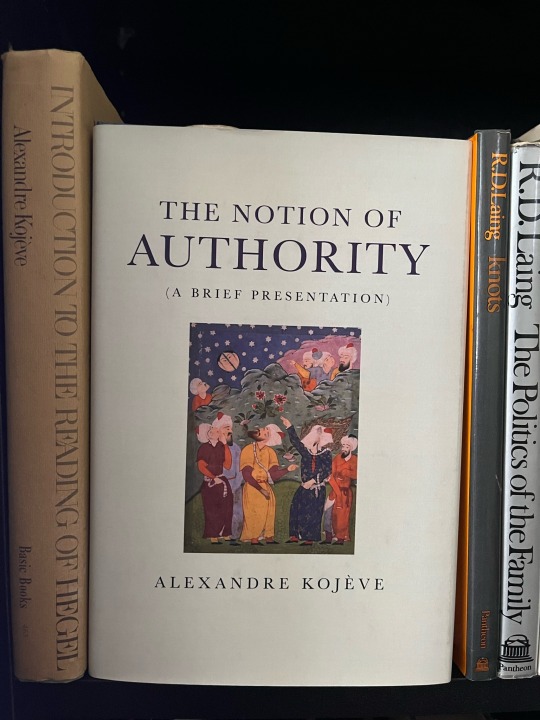
“There is no doubt that, on the one hand, every Authority tends to become total: the Authority of one given type tends to capture the Authorities of other types. On the other hand, the metaphysical structure of Authority is antithetical to its division: three modes of Time naturally constitute one bloc, and Eternity is real only in and through its union with Time. It therefore seems that analysis of the phenomenon of 'Authority’ prohibits any division of political Authority, and any 'separation of powers'. It is therefore useless to insist on all the arguments of a practical nature that have been set against the 'constitutional' theory and practice (see for example Rousseau). It seems that, generally speaking, the division of an entity weakens it: the sum total of the powers of separated parts is less than the power of the same undivided whole. In fact, the division is not real (it has a meaning and a raison d'être) only if the separated parts are inclined to enter into conflict with one another; or if a conflict (even a latent one) looks as if it must necessarily 'neutralise' a part of the powers that are in question, in such a way that this 'lost' part of the power constituted by the sum total of powers of the separated parts, taken in isolation, would need to be deducted. Thus it seems better to give a political Authority taken en bloc one and the same (collective or individual) 'support’.
But the arguments - of a practical nature - uttered in favour of the thesis of the separation of powers are also very strong. Besides, these arguments are also well known, and we need not elaborate on them. Let us just say that the metaphysical analysis itself can, in a certain sense, be cited in support of the thesis in question. In fact, if it is true that the three modes of Time form a unity, it is also true that there would be no Time at all if there were no separation between the three modes - that is to say, also some sort of 'tension' or 'conflict’ between them. Similarly, if Eternity, being the totality of the three modes of time, forms a unity with it, it is also opposed to it in so far as the totality (the whole) is something other than the sum total of the parts. It is simply that, in both cases, the opposition, or, if we like, the separation, does not mean isolation of the separated or the opposed. There is interaction - that is to say, separation, since there are two (or several) agents; but there is also union, since there is action of an agent on one or many others inseparable from the reaction.
It follows for the question that interests us that, even when we want to separate the Authorities that in their ensemble constitute political Authority, they must not be isolated from one another by having each one of them withdraw into itself. They have to be able to act and react on one another: their dynamic union must be preserved despite their static division. (For example, if we separate the - legislative - Authority of the Leader from the - political-judicial - Authority of the Judge, the latter must not be pinned down by a system of laws that are in principle immutable, or by a Constitution that is supposedly unchangeable. Conversely, we must not establish the Authority of an ‘irresponsible' Leader, as is the case with that of the Monarch - that is to say, diminish the action of the Authority of the Judge, and so on.)
But if the thesis of the ‘isolating' separation of Authorities is rejected, should the principle of separation itself be preserved?
In order to answer this question, let us make a remark that is generally overlooked: when one and the same (individual or collective) 'support' is used by several pure types of Authority, there is always a tendency to develop one of those types (the 'dominant' or 'primary' type) at the expense of the others: the 'derivative' types cannot manage to develop completely as such, and remain at an embryonic stage. If we wish the four 'pure' types of Authority to be perfectly and completely realised, it is therefore necessary to allocate independent 'supports' to each one of them - that is to say, to 'separate powers'.
Note: This is also true for the Authority of the Leader and the Authority of the Master, which nevertheless cannot be separated. But there is here no political hindrance, because we can show that with political progress the Authority of the Master must give way to that of the Leader - that is to say, it will 'degenerate'. It even seems that it must completely disappear in the 'ideal' State of the future. Generally speaking, the Authority of the Master presupposes the real possibility of war and bloody revolution, and it thus presupposes its own disappearance along with them.
Political evolution goes from the unity of political 'power' to the separation of 'powers'. But what we have just said 'justifies' this state of things: in order for each 'pure’ type to reach the plenitude of its development, it has to be separated from the others. But this does not mean that Authorities must remain 'divided' even after they have realised all their implicit possibilities. It seems, on the contrary, that they will have to reunite again. Political evolution would therefore start from the non-differentiated unity (the unity of the embryonic form), and go through a period of division and development of the separated elements, finally leading to totality - that is to say, to differentiated unity (the unity of the adult organism).” (pages 80 - 83)
#kojeve#kojève#alexandre kojève#notion of authority#authority#time#hegel#laing#rd laing#books#book lover#bookshelf#library
6 notes
·
View notes
Text
apparently a square enix manga (comedy+romance genre) is abt to get an anime adaptation oh god it probably wont be cm but . What If 👁️👄👁️
#my post#IF WE GET A CM ANIME IDK WHAT ILL DO W MYSELF#GONNA PRAY SO HARD THO PLS..... i need this after the la drama and rd ending 😔😔#sensei didnt make her usual cryptic tweet abt it so i doubt it but still. manifesting
20 notes
·
View notes
Text
im so *BANGS MY FIST AGAINST THE TABLE OBNOXIOUSLY* about red dead
#i feel like im gonne DIE!!!!!!!#or like#lose my mind if i think about it too long#shit is ahh..#weird#bizarre (pronounced à la française)#rd#rdr2#red dead redemption 2
13 notes
·
View notes
Text
The female character who moves me the most in recent times is Molly O'Shea. She deserved everything better. I wish more than anything that she could've been happy and had someone who genuinely loved her. Even if that was only a friend.
#I am very much in love with her#shes the only female character who I've ever successfully written x readers for#it used to break my heart the shit people would say about her in the fandom#she was literally the victim of abuse but god forbid her fandom sexyman bf be held accountable for it#no no she must've deserved it 🙄#at least in my canon she escaped with my oc at the end along w Keiran#and they lived all the way into the 1940s together happily#thats how it ended for me 😤#I actually debated whether or not my LA OC knows the adult children of my red ded OC#I mean itd make sense#plus that ties my two r* plots together#however what makes that weird is that Roy is a big part of my rd oc's backstory :)#this is the issue with constantly including the same guy in every story for 5 years#anyway Id die for Molly if I had to#thats the point of this post I wanna kiss her and send her love letters like I did in 1 of the fics I wrote like 3 years ago#sunny speaks#tw abuse mention
7 notes
·
View notes
